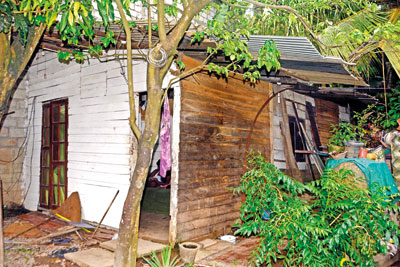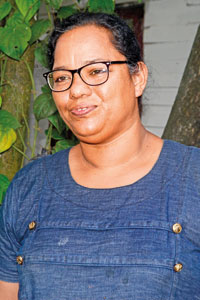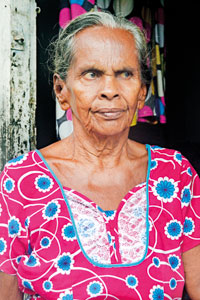News
Lost in the process of Aswesuma
View(s):- What happens to the Mathurams, Fatimas, Nilukas and others who have been left out of a social welfare scheme meant to help the very people like them
By Mimi Alphonsus and Dilushi Wijesinghe
The couple was away just a fortnight. Back in their hometown Mannar, enumerators recruited by the local government went from door-to-door to register applicants for the new social welfare scheme, Aswesuma, which would replace Samurdhi benefit payments.
Mr. Mathuram and Mr. Silva missed the visit.

Niluka (inset): Although the sole breadwinner for her family she was told not to apply. Pix by Priyanka Samaraweera
Jointly funded by the government and the World Bank—which has loaned US$ 200mn (Rs. 64.5bn)—Aswesuma is intended to be an “objective” and “multi-dimensional poverty indicator”. Enumerators visit applicants at home to fill in questionnaires based on 22 indicators, including condition of housing, possession of a vehicle, electricity bill, income and expenditure. Although developed in 2018, the methodology is being implemented for the first time this year.
The indicators are then scored, weighted and a verdict pronounced based on a district cut-off. Recipients are categorised as extremely poor, poor, vulnerable, and transitional and receive payments accordingly. After much protest, an appeals process was created for those initially found ineligible or are seeking a higher payment. But not everyone who can appeal has managed to do so.
In the first cycle of the programme, a staggering 374,527 original applications (not appeals) across the country were not enumerated, according to district disaggregated data from the Welfare Benefits Board (WBB). The WBB attributes this to reasons such as applications being filed under two different addresses or applicants not being home during enumerator visits.
Under the Aswesuma process, applicants who were left out, like Mathuram, can file appeals. But she didn’t even know she was eligible. A lack of consistent and credible information—as well as a strict deadline of 20 days from publication of the lists of approved applicants—have thrown those wanting to appeal into dire confusion.
When Grama Niladharis and Samurdhi officers decided not to participate in appeals applications due to fears of being held liable for false information, the government instructed divisional secretariats to hire post-A/Level students as enumerators. Ultimately, a combination of development officers, temporary recruits and local government officers did the job. Some notified candidates before visiting their homes. Many did not. 
Among people who found themselves excluded were those who speculated the enumerator might have arrived while they were at work or running errands. While they were uncertain when the visits had been, they were aware their neighbours had been counted. With the appeals date passed, Mathuram and others will have to wait until the next round.
There are other problems. In Kolonnawa, the owner of a small communication shop (he did not wish to be named) found himself carrying out a new task. In addition to the usual photocopies, printouts and phone reloads, he scanned QR codes. People in the area who want to lodge appeals must use a unique QR code to access their application, to identify errors and check their status. But many Aswesuma applications have low IT literacy or no smartphones. So they flocked to the shop to have their codes scanned.
The divisional secretariat (DS) advised those who had difficulty using the technology to seek assistance from communication shops, the owner said. So he helped them—at no charge, on his own time and using his own data. “Many came to us” he reflected. “We did it out of kindness and because we have known some of them for many years.”
People like him shouldered the burden of filling the gap between the State’s push for digitalisation and the ground reality. According to the World Bank, as of 2021 only 44.5% of Sri Lankans used the internet. Many applicants we interviewed did not have a smartphone and hadn’t seen their applications using the QR code at all.
Owing to widespread difficulties related to the QR code, some DS offices devised their own mechanisms to assist. In one division, officers installed laptops in their main hall and invited applicants to come and appeal their decisions with staff help. This was neither mandated nor funded by the WBB which only paid Rs. 300 per application to enumerators and Rs. 10 to upload content.
The WBB doesn’t deny challenges related to the QR code. But an official explained: “We do not have the capacity to do everything. The NGOs and the community could have played a bigger role since they want to help people.” Introducing a new system is always difficult, he pointed out.
Notwithstanding all this, the WBB did receive over 1.2 million appeals. Interestingly, we calculated that—as of July when the number of appeals stood at just below 1 million—65 percent were from people who had been found eligible but wanted to be upgraded to a higher level.

Manel Ratnawali
Appeals are now under review, with decisions pending. But for people who hadn’t submitted one, this is of little use.
Fatima Farzana, 54, lives with four elderly, ailing relatives in a one-bedroom house in Mattakuliya. There’s no permanent wall at the back of the abode, just haphazard wooden boards. Fatima is the only consistent income earner. She sells pol roti and plain tea from a stand, making around Rs. 800 a day. The community supports them, taking turns bringing cooked meals once a day. Fatima has no TV and relied on a Samurdhi officer for information. He incorrectly told her that, since her late father had been a Samurdhi beneficiary, she would automatically qualify. So they did not apply for Aswesuma.
Other rumours—such as that Aswesuma is not for families with adult dependents or for those who own televisions—have also not been successfully countered.
Niluka, a mother of two children aged five and 10, did not apply for Aswesuma. She works a few days a week as a domestic aide but the money is never enough. Her two children go to different schools. When money is short, she chooses which of her children to send. Niluka’s husband is an alcoholic. She is effectively the sole breadwinner. But her husband is also a government worker, so officers told her she shouldn’t apply.
Civil society representatives say that, in plantation areas, workers have historically been excluded from social welfare programmes. The cycle has continued with Aswesuma. Plantations show the highest poverty rate in the country, hitting 51%, according to a LIRNEasia study.
But many workers there did not apply for Aswesuma, thinking that government programmes were not intended for them. Local authorities often prioritise village inhabitants rather than the residents of plantations, so the dissemination of information about the scheme, including eligibility criteria, is extraordinarily low.
Additionally, the WBB reportedly does not have disaggregated data for plantations meaning that it is impossible to assess whether Aswesuma is going to the country’s most impoverished population. The WBB admitted they had noticed underrepresentation of applicants in certain districts like Kegalle, Badulla, Nuwara Eliya, and Polonnaruwa and said that they would investigate.
Even successful applicants said their troubles were far from over. Manel Ratnawali, a 73-year-old from Wanathamulla, still hasn’t received her payment. She has found it impossible to get more information.
“They told me to go to this department and when I went there, they sent me in circles and after spending the whole day they told me to just leave,” she said. “Finally, I gave up.”
Poverty had risen to over 30% of the population as of June this year, a LIRNEasia study found. And exclusion errors have severe implications. Iromi Perera, the director of Colombo Urban Lab said, “People have a lot of fear about not being included in Aswesuma, not just because of the cash, but because those indicators are used for other benefits too, such as low-interest loans, and in determining who receives support during crises like the pandemic or floods.”
The question now is when applications will be reopened. Some Wattala residents who missed the deadline said they visited one government office after another until finally being told, “Wait till they announce the next round on TV. Till then take loans and do what you must to survive.”
| Challenges faced by Welfare Benefits Board The Welfare Benefits Board is carrying out the expedited Aswesuma programme amongst many challenges such as capacity shortcomings, officials told the Sunday Times, requesting not to be named. The public had been inadequately educated, they conceded. The government had insufficient funds to fill this and other gaps so the community leaders, NGOs and others must help. People did not realise they will be re-evaluated every year and could lose the benefit if their financial situation improved. Others applied with two ID cards (old and new) or two addresses, to “trick” the system. These inconsistencies popped up as the process was digital. The ensuing investigations caused delays. “Then we get blamed when payments are late,” one official said. People also sometimes split their families into two, hoping to get double payments. But the system didn’t work that way. “We have a quota for the number of people to pay,” the official explained. “When people split their families in two, they don’t get more money and also deprive another family from getting it.” “This is a revolutionary change so of course it’s going to be messy initially,” he pointed out. “Media needs to emphasise the good, like how many people are being covered through Aswesuma that wasn’t included before”. Meanwhile, divisional secretariat (DS) officials said the WBB gave a one-and-a-half-month deadline to finish all enumeration. It was the same for DS divisions with a few thousand applicants as it was for those with tens of thousands. They had to campaign and hire many enumerators quickly and were initially given incomplete information by the WBB. “When we asked for more details about the process and timeline, we did get it,” one official said, also requesting anonymity. “For instance, we were pressured to finish the appeals process quickly but only got the relevant guidelines from WBB last week (the end of September). Thankfully, we had anticipated this and used similar guidelines to what was suggested.” People thought Aswesuma was the same as Samurdhi. While the WBB had been urged to carry out a huge media campaign, there was not much beyond a gazette, the initial media release calling for applications and an advertisement. “We had to enter most appeals ourselves because people don’t have IT literacy,” the official pointed out. And the deadline is just 20 days. “People were shouting when they learned they weren’t selected,” she said. “I lost my voice having to face them. Enumerators had to fund their transport from their incentive. We were given training guidelines but had to organise it ourselves.” Strengthening the social safety net was a key component of the IMF programme in Sri Lanka and Aswesuma needed to be expedited to meet deadlines. In light of this, the Sunday Times also found that the refusal of Samurdhi officers and Grama Niladharis to get involved had been | |
The best way to say that you found the home of your dreams is by finding it on Hitad.lk. We have listings for apartments for sale or rent in Sri Lanka, no matter what locale you're looking for! Whether you live in Colombo, Galle, Kandy, Matara, Jaffna and more - we've got them all!

